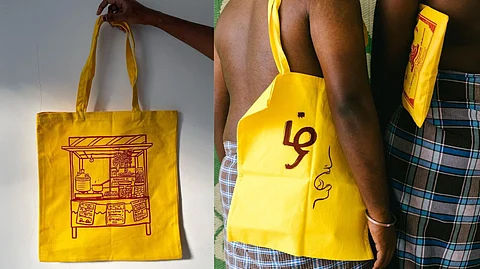
- HOMEGROWN WORLD
- #HGCREATORS
- #HGEXPLORE
- #HGVOICES
- #HGSHOP
- CAREERS
- ABOUT US
- CONTACT US

An integral part of Tamil culture, the manjappai is synonymous with the community's rich culture and heritage. A rather simple looking item at first sight, this cloth bag reflects the intelligent use of natural resources around us and inspires a minimal lifestyle. They have been used by different generations in innumerable ways and are reminiscent of a bygone era. Unfortunately in recent years this household staple has been overtaken by other more modern bags available in the market.
The manjappai bags were used to carry everyday items including medicines, documents, ration, money, groceries, jewellery and much more. The bag is also used at special occasions such as weddings, with the names of the bride and groom printed on them and they were also used in the branding for many shops around the state. The cloth bag is dipped in turmeric water and then dried for use, which is believed to give it antibacterial properties that can fight infections.
The vibrant bag is now making a return and reclaiming its close affiliation to Tamil identity. According to The News Minute, Tamil Nadu’s Chief Minister MK Stalin launched the ‘Meendum Manjapai Vizhipunarvu Iyakkam’ campaign in order to encourage people to quit using plastic bags and instead revive the usage of the traditional yellow bags. These bags are not only a cultural symbol but also promote sustainability.
In 2014 a young couple also quit their jobs at Amazon to start the Yellow Bag Foundation. Krishnan Subramanian and Gowri Gopinathset out to start a business promoting eco-friendly cloth-based products. They noticed how many women were involved in sewing manjappai bags and decided to support their local craft by sourcing directly from them. This also helped in those women to maintain a livelihood and source of income.
The significance of manjappai is only growing as several communities on social media are also reviving the cultural symbol. The Manja Pai Collective on Instagram is archiving the nostalgic memories associated with the bag and sharing the bag's indigenous roots with people of different communities; making the consciously crafted bag both trendy and culturally relevant once again.
If you enjoyed reading this, here's more from Homegrown:
A Group Of Young Homegrown Chefs Are Elevating & Shining A Spotlight On Coorg Cuisine
How India's First Homegrown Ink Company Was Born During The Swadeshi Movement
Scorpion Smoking & Other Homegrown Hallucinogens You've Probably Never Even Heard Of
